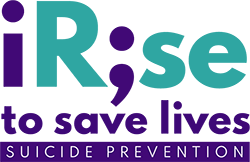I'm Worried About Someone
If you are feeling suicidal right now, please call 1-800-273-TALK in the U.S. or visit IASP to find a helpline in your country.
It can be scary when a friend or loved one is thinking about suicide. Let us help. If someone you know has any warning signs, we encourage you to call 1-800-273-TALK (8255), so that you can find out what resources are available in your area. Your call will be routed to the Lifeline Center closest to your area code. Your local crisis center may have resources such as counseling or in-patient treatment centers for your friend or family member. Most importantly, please encourage them to call the Lifeline Center.
How to be helpful to someone who is talking about suicide:
- Be direct. Talk openly and matter-of-factly about suicide.
- Be willing to listen. Allow expressions of feelings. Accept the feelings.
- Be non-judgmental. Don't debate whether suicide is right or wrong, or whether feelings are good or bad. Don't lecture on the value of life.
- Get involved. Become available. Show interest and support.
- Don't dare him or her to do it.
- Don't act shocked. This can put distance between you.
- Don't be sworn to secrecy. Seek support.
- Offer hope that alternatives are available. But do not offer glib reassurance.
- Take action. Remove dangerous means, such as guns or stockpiled pills.
- Get help from professionals or agencies that specialize in crisis intervention and suicide prevention.
Many people, at some point in their lives, think about suicide. Most decide to live once they come to realize that the crisis is temporary and death is permanent. In contrast, there are some who may perceive their dilemma as inescapable and feel an utter loss of control.
Some feelings and thoughts they may experience include:
- Can't stop the pain
- Can't think clearly
- Can't make decisions
- Can't see any way out
- Can't sleep, eat, or work
- Can't escape depression
- Can't make the sadness go away
- Can't see a future without pain
- Can't see themselves as worthwhile
- Can't get someone's attention
- Can't seem to find control
If you experience these feelings, you are not alone. Seek help.
If someone you know exhibits these symptoms, offer support or contact a professional for assistance!
This content was developed by the American Association of Suicidology.
Resources:
Grief is a normal response after losing someone important to us. When someone dies by suicide, those bereaved often experience a very complicated form of grief caused by a combination of sudden shock, unanswered questions of “Why?”, and feelings of “What could I have done?” They may experience a range of emotions highlighting the dramatic personal effect suicide can have and the important, yet difficult, task of helping someone bereaved by suicide…READ MORE
If you are feeling suicidal right now, please call 1-800-273-TALK in the U.S. or visit IASP to find a helpline in your country. We also encourage you to talk to someone you trust and let them know about the struggles you are facing…READ MORE
Discovering that someone you care about has tried to end their life can be a devastating experience. You may initially experience emotions such as shock and denial. Sometimes those close to the suicidal person blame themselves for what has happened and may have thoughts similar to, “If only I’d watched them more closely.” It’s important to understand that if someone close to you has attempted suicide, it is not your fault…READ MORE
It can be scary when a friend or loved one is thinking about suicide. Let us help. If someone you know has any warning signs, we encourage you to call 1-800-273-TALK (8255), so that you can find out what resources are available in your area. Your call will be routed to the lifeline center closest to your area code. Your local crisis center may have resources such as counseling or in-patient treatment centers for your friend or family member. Most importantly, please encourage them to call the Lifeline…READ MORE
National Suicide Prevention Lifeline 1-800-273-TALK (8255)
National Hopeline Network
1-800-SUICIDE (1-800-784-2433)
These toll-free crisis hotlines offer 24-hour suicide prevention and support. Your call is free and confidential.
CALL NOW
Supporting someone who has attempted suicide can be emotionally draining, stressful, and exhausting. It is not possible to watch over someone 24/7 and this is not something you need to deal with alone.
Ensure you have adequate support systems in place for yourself. Identify trusted family members or friends that you can talk to or join a local support group.
If you are finding it difficult to deal with the strain of the situation, you may also wish to consider counseling or professional support for yourself. It is vital that you look after yourself and get the support you need.
If you live in the U.S. and don't know who to turn to, call:
The National Suicide Prevention Lifeline at 1-800-273-TALK (8255)
or The National Hopeline Network at 1-800-SUICIDE (1-800-784-2433).
These toll-free crisis hotlines offer 24-hour suicide prevention and support. Your call is free and confidential.
CALL NOW
